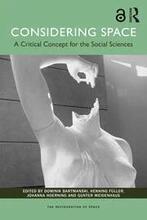CCS Faculty Fellow Dominik Bartmanski’s newest co-edited book, Considering Space: A Critical Concept for the Social Sciences (with Henning Füller, Johanna Hoerning, and Gunter Weidenhaus) is out now!
From the publisher:
“Considering Space demonstrates what has changed in the perception of space within the social sciences and how useful – indeed indispensable – this category is today.
While the seemingly deterritorializing effects of digitalization might suggest that space is a secondary consideration, this book proves such a presumption wrong, with territories, borders, distances, proximity, geographical ecologies, land use, physical infrastructures – as well as concepts of space – all being shown still to matter, perhaps more than ever before.
Seeking to show how society can and should be perceived as spatial, it will appeal to scholars of sociology, geography, architecture and urban studies.
The Open Access version of this book, available at www.taylorfrancis.com, has been made available under a Creative Commons Attribution-Non Commercial-No Derivatives 4.0 license. Funded by the DeutscheForschungsgemeinschaft (DFG, German Research Foundation)”
Critical Reviews:
‘Mixing conceptual exploration and case illustration, this lively volume will make its readers think again and anew about the role of space in social theory and social life.’ Loïc Wacquant, Professor of Sociology, University of California Berkeley
‘The idea that space is socially constructed has long been accepted, but it has proved harder to make the case that the social is spatially constructed. This book relishes this challenge, providing new conceptual tools, epistemological advances and empirical evidence. It does so much more than this, though. It provokes us to think about the relationship between socially constructed space and the spatially constructed social. This is a profoundly political task, as this book provides new paths, new opportunities, new affordances for thinking about the current conjuncture, the crisis of crises.’ Steve Pile, Professor of Human Geography, The Open University, UK
This book excels at bringing to bear the tools of critical reflection onto fundamental spatial concepts and the representational logics on which such concepts are often based. The range of empirical examples is admirable, showing that space ought to be central to theory of social life, not incidental. This collection is of an excellent standard, and its writing first rate.’ Eduardo de la Fuente, University of South Australia
